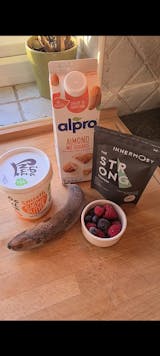One of the greatest debates in the fitness community is whether to eat before or after a workout. And this debate has follow-up questions: what to eat, how long before or after workouts you should eat it, and why certain foods are beneficial at certain times. Yeah… it’s a minefield.
Firstly, your body will respond differently to exercise depending on how you have prepared for your workout. What this means is if you have eaten before, your body will engage in different processes during exercise than it would if you had not eaten, and this can affect your performance, results and progress towards your fitness goals. Make sense?
Both fuelled and fasted exercise have their benefits, but here at Innermost we wanted to put these benefits to the test to try and finally find an answer to this age old question: should I be eating before workouts or after?
Let’s discuss…
What is fuelled exercise?
Firstly, it’s important to note that proper nutrition (that is, a healthy balanced diet), is the key fuel for your exercise. This is what gives you energy, so it’s hugely important to ensure your body is properly fuelled at all times to prevent injury and maximise performance.
Generally, the best food type to fuel your body with before exercise is carbohydrates. This is because this a vital nutrient involved in physical performance, as carbohydrates are a huge source of energy.
Nutritionists recommend that you eat a full meal around two to three hours before a workout to ensure that you are in a healthy state to be engaging in high-energy workouts, with research suggesting that fuelled, or ‘fed’ exercise can boost your ability to workout for longer periods of times, therefore leading to better results.
Not only will fuelled exercise lead to these better results, being properly hydrated and energised will ensure you aren’t putting yourself at risk of injury. If you don’t get the nutrients your body requires around the hours of exercise, you are putting yourself at risk of fatigue. And no one wants that.
What is fasted exercise?
Fasted exercise refers to taking part in exercise before eating. The logic behind this is simple. Weight-loss is one of the widely discussed, rumoured benefits of fasted exercise.
This is because it is believed that when exercising on an empty stomach, or without having eaten in a prolonged period, your body will harvest the energy it requires to complete the workout from the breakdown of your stored fat, rather than taking it from the food that you have eaten throughout the day.
Whilst this sounds great if your fitness goal is to lose weight, as it insinuates that you will be breaking down more fat and therefore shedding more pounds, it’s important to remember that this is not the case. Unfortunately, it’s not that simple. Using fasted exercise to lose weight isn’t recommended.
This is because this breakdown in fat does not mean that you will lose more fat, as research has shown mixed results in this area. A lot of research into this area actually suggests that working out on an empty stomach can lead to the loss of energy and reduced stamina.
Plus, as we’ve said above, fuelling your body correctly and efficiently before a workout is vital to maintain adequate health and wellness levels. Don’t ignore what your body needs. Period.
Should I be eating around a workout?
So, should I eat before a workout? Yes. Should I eat after a workout? Also yes. Just make sure what you’re eating is nutritious, healthy and portion-controlled.
Here at Innermost, we are believers in fuelling your body properly and efficiently, with fresh ingredients, research-based, naturally-derived products and high quality nutrients. With that in mind, some of our favourite pre-workout go-to’s include:
- Fruit smoothies
- Bananas
- Whole grain rice
- White fish
- Chicken breast
- Apple slices and peanut butter
- Porridge or oats
- A protein shake
Need some more inspiration for healthy delicious meals? Why not try out Our Five Favourite On-The-Go Lunches, Protein Pancake Recipes, or our Fiery Asian Chicken Soup? They’re pretty good if we do say so ourselves, and full of nutrients. Winner.
However, if you stumbled across this article because you’re feeling fatigued and struggling for energy, check out The Energy Booster. Created with BCAAs (and without way too much caffeine), here at Innermost we wanted to formulate a product that boosts your energy naturally. The Energy Booster has won some pretty cool awards, so we think we’ve done alright. Definitely worth checking out… in our opinion.
References
- Aird, T. P., Davies, R. W., & Carson, B. P. (2018). Effects of fasted vs fed‐state exercise on performance and post‐exercise metabolism: A systematic review and meta‐Scandinavian journal of medicine & science in sports, 28(5), 1476-1493. Click here.
- Pacy, P. J., Barton, N., Webster, J. D., & Garrow, J. S. (1985). The energy cost of aerobic exercise in fed and fasted normal subjects. The American journal of clinical nutrition, 42(5), 764-768. Click here.
- Vieira, A. F., Costa, R. R., Macedo, R. C., Coconcelli, L., & Kruel, L. F. (2016). Effects of aerobic exercise performed in fasted v. fed state on fat and carbohydrate metabolism in adults: a systematic review and meta-analysis. The British journal of nutrition, 116(7), 1153–1164. Click here.























